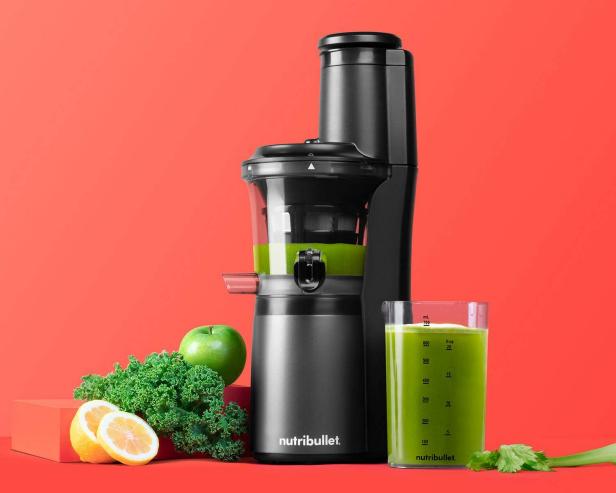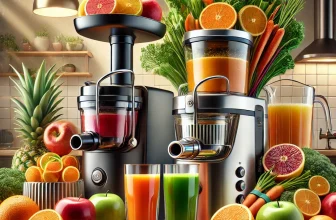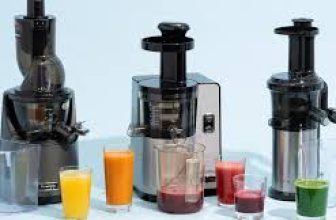As an Amazon Associate I earn from qualifying purchases.
Which Juicer Is Better?
Which Juicer Is Better? Choosing the best juicer can feel like navigating a maze of options, each promising to deliver the perfect glass of juice. For instance, a recent survey found that 62% of consumers were unsure if they should choose a centrifugal or masticating juicer. This uncertainty often leaves even the most knowledgeable buyers scratching their heads.
No products found.
Centrifugal juicers, which have been around since the 1950s, are known for their speed and convenience. However, masticating juicers are gaining popularity due to their ability to extract more nutrients, thanks to their slow, grinding process. In fact, tests show that masticating juicers can retain up to 30% more vitamins and minerals than their centrifugal counterparts, making them a compelling option for health-conscious individuals.

Which juicer is better?
Choosing the better juicer depends on various factors, including your specific needs and preferences. Two popular types are centrifugal and masticating juicers. Centrifugal juicers are known for their speed, using a fast-spinning blade to extract juice quickly. However, this can generate heat, which may destroy some nutrients. On the other hand, masticating juicers use a slow grinding process, preserving more vitamins and minerals.
Masticating juicers are often preferred by health enthusiasts. Their slow, cold-press method results in higher juice yield and retains more nutrients. They are also quieter, which can be an important factor for some users. Despite these advantages, masticating juicers tend to be more expensive. This can be a deciding factor based on your budget.
When it comes to cleaning, centrifugal juicers generally win. Their parts are simpler and easier to clean, often requiring less time. Masticating juicers, with their more intricate designs, can be more challenging to clean thoroughly. This makes centrifugal juicers more convenient for daily use. Considerations like these play a crucial role in choosing the better juicer.
To make an informed choice, consider what you’re prioritizing. If speed and convenience are top of your list, a centrifugal juicer may be the better option. If nutrient retention and juice quality are your main concerns, a masticating juicer could be worth the investment. Ultimately, the best juicer for you aligns with your lifestyle and health goals.
Comparing Centrifugal and Masticating Juicers
Centrifugal juicers operate by spinning blades at high speeds to separate juice from pulp. They are typically faster and more affordable, ideal for individuals looking for quick results. However, the high-speed rotation generates heat, which can reduce the juice’s nutrient content. These juicers are perfect for those who need to make juice in a hurry. But, they may not be the best choice for someone prioritizing nutrient retention.
Masticating juicers, in contrast, use a slow grinding mechanism to extract juice. This method retains more vitamins and nutrients as it produces less heat. Masticating juicers are known for their ability to handle leafy greens and other fibrous vegetables. They are quieter than centrifugal juicers, which can be a significant advantage. However, they often come with a higher price tag.
In terms of ease of use, centrifugal juicers tend to be simpler to assemble and clean. They have fewer parts, which makes maintenance straightforward. Masticating juicers, with their complex parts, require more effort to clean. This can be a downside for those with a busy lifestyle. Therefore, ease of cleaning is a crucial factor to consider.
To summarize the differences, consider these points:
- Speed: Centrifugal juicers are faster.
- Nutrient Retention: Masticating juicers preserve more nutrients.
- Noise: Masticating juicers are quieter.
- Cost: Centrifugal juicers are generally cheaper.
Your choice will depend on your specific needs and priorities.
Understanding the Functionality of Centrifugal Juicers
Centrifugal juicers are widely loved for their speed and efficiency. They work by using a high-speed spinning blade that shreds fruits and vegetables. The shredded produce is then pushed through a fine mesh filter to extract the juice. This process is quick, often producing a glass of juice in under a minute. This makes them ideal for busy mornings or when you’re in a rush.
One of the standout features of centrifugal juicers is their larger feed chute. This allows you to insert whole fruits and vegetables without pre-cutting. As a result, preparation time is significantly reduced. However, the high-speed operation can generate heat and foam. This might reduce the overall quality of the juice.
Centrifugal juicers are generally easier to clean compared to their masticating counterparts. Many models come with removable parts that are dishwasher safe. This convenience can be a big plus for daily users. However, they can be noisy during operation. This might be a concern if you prefer quieter appliances.
Consider the key features:
- Speed: Fast juice extraction.
- Feed Chute: Larger size for whole produce.
- Cleaning: Easier and dishwasher safe parts.
- Noise: Louder during use.
These aspects highlight why centrifugal juicers are a popular choice.
The Science Behind Masticating Juicers
Masticating juicers, also known as slow juicers, utilize a unique method to extract juice. They operate at a low speed, typically around 80 to 100 RPM. This slower rate reduces heat buildup, preserving more of the vitamins and minerals found in fresh produce. The slow, grinding mechanism crushes the fruits and vegetables, separating the juice from the pulp. This method is more efficient in retaining nutrients and enzymes essential for health.
One significant advantage of masticating juicers is their ability to handle a wide variety of produce. They excel at juicing leafy greens, wheatgrass, and even softer fruits like berries. The versatility of these juicers expands beyond just juice extraction. They can also be used to make nut butters, baby food, and even pasta. This multifunctionality makes them a valuable kitchen appliance.
Noise level is another notable difference between masticating and centrifugal juicers. Masticating juicers operate much quieter due to their slower speed. This can be a big plus for those who don’t want to disturb others in the household. Additionally, the sturdy design of masticating juicers often results in longer-lasting machines. Their durability means you won’t need to replace them as frequently.
Cleaning a masticating juicer can be more challenging, but many users find it worth the effort. The various removable parts might take time to disassemble and wash. However, some models offer dishwasher-safe components, making the process easier. Despite this, regular maintenance is crucial to ensure the juicer’s longevity and performance. Manual cleaning allows you to thoroughly check and maintain each part.
Key benefits of masticating juicers include:
- Nutrient Preservation: Less heat, more vitamins.
- Versatility: Juice, nut butters, baby food, pasta.
- Noise Level: Quieter operation.
- Durability: Longer-lasting appliances.
Understanding these aspects can help you appreciate why masticating juicers are often recommended for serious juicers.
Making the Perfect Choice Based on Your Lifestyle
Deciding on the ideal juicer largely depends on your lifestyle and daily habits. If you lead a busy life and need a quick, convenient option, a centrifugal juicer might be the best fit. These juicers can whip up a glass of juice in under a minute, making them perfect for mornings when time is tight. They are also easier to clean, fitting seamlessly into a hectic routine. Their speed and simplicity make them ideal for those who value convenience.
If you are focused on health and nutrition, a masticating juicer provides significant benefits. The slow grinding process retains more nutrients and enzymes, making your juice healthier. Masticating juicers are excellent for those who juice leafy greens, wheatgrass, or softer fruits. They are versatile and can even make nut butters and baby food. Though they may take longer to clean, the nutritional advantages are worth the extra effort.
Budget is another important factor to consider. Centrifugal juicers are generally less expensive and offer great value for those just starting with juicing. Masticating juicers tend to be pricier but come with added benefits and a higher juice quality. Determining how much you are willing to spend can help narrow down your choices. Affordable options often provide good quality without breaking the bank.
Noise level can be a deciding factor, especially for households with light sleepers or babies. Masticating juicers are quieter, making them ideal for early morning or late-night juicing. Centrifugal juicers, while louder, complete the job quickly. Assessing your noise tolerance and household needs can guide you to the best choice. Choose according to when and how often you’ll be using the juicer.
When weighing all these factors, it’s helpful to create a list of priorities:
- Speed and Convenience
- Health and Nutritional Benefits
- Budget
- Noise Level
Aligning your choice with these priorities will help you find the juicer that best matches your lifestyle.
Frequently Asked Questions
If you’re trying to choose the right juicer, these frequently asked questions can guide you. Discover the differences between types of juicers and how they fit your lifestyle needs.
1. How does a centrifugal juicer work?
A centrifugal juicer uses high-speed spinning blades to shred fruits and vegetables. The spinning motion extracts juice by pushing the pulp through a fine mesh filter. This method is quick, often producing juice in under a minute.
However, the speed creates heat that can reduce enzyme and nutrient levels in your juice. This makes it less ideal for those focusing on maximum nutrition but great for convenience.
2. What are the benefits of using a masticating juicer?
Masticating juicers extract juice slowly, preserving more nutrients and enzymes due to their low-speed operation. They are excellent for leafy greens, wheatgrass, and softer fruits like berries.
This type of juicer also produces higher-quality juice with minimal oxidation, extending shelf life. Users find it perfect for maintaining a health-focused diet despite its typically higher cost and slower prep time.
3. Are masticating juicers more expensive than centrifugal ones?
Generally, masticating juicers are pricier because they offer better nutrient retention and greater versatility. These machines are built with more robust components designed for various functions beyond just making juice.
Centrifugal models are usually less expensive but focus mainly on quick juice extraction without as many features. Your choice should be guided by whether you prioritize cost or long-term health benefits.
4. Can I use citrus fruits in both types of juicers?
Yes, both centrifugal and masticating juicers can handle citrus fruits such as oranges and lemons effectively. However, some users prefer dedicated citrus pressers for easier operation and cleaning when only dealing with citrus.
Masticating juicers often produce less foam when juicing citrus compared to centrifugal ones, leading to smoother juice texture. Centrifugal models may require you to peel thicker-skinned fruits beforehand.
5. Is it difficult to clean masticating and centrifugal juicers?
Centrifugal juicers are generally easier to clean due to their simpler design with fewer parts to disassemble and wash. Many models come with dishwasher-safe components which further streamline maintenance.
Masticating juicers have more complex parts which may take longer to clean; however, some have dishwasher-safe elements too. Regular cleaning ensures both types remain efficient and prolongs their lifespan.
Conclusion
Choosing between a centrifugal and masticating juicer ultimately depends on your lifestyle and priorities. Centrifugal juicers offer speed and convenience, perfect for busy schedules. Meanwhile, masticating juicers provide superior nutrition and versatility, making them ideal for health enthusiasts.
Consider factors like nutrient retention, noise levels, and budget when making your decision. Both types of juicers have their unique advantages and drawbacks. By evaluating your needs and weighing the benefits, you can make an informed choice that best suits your juicing habits.

Maksuda Khanam is a passionate home appliance expert and the primary author behind KitchenMarts.com






